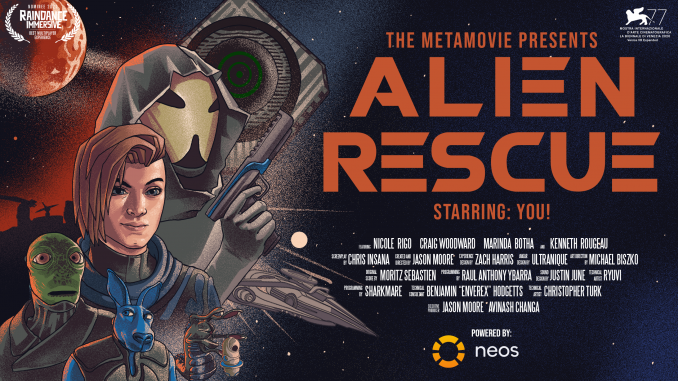
By Matt Hirsch
Getting lost in narratives that take place in fantastical worlds that are far more interesting than our own has been part of human interest for as long as stories have existed. As technology advances, so too does the desire to get lost in these tales.
Now that virtual reality technology is readily available, Brooklyn College Professor Jason Moore is pushing the boundaries of immersion in narrative-driven storytelling.

“When I was a kid, I saw ‘Star Wars: A New Hope’ for the first time in the theaters…And I have this very vivid memory of watching one of the scenes when they’re in the Millennium Falcon shooting at tie fighters,” Moore told The Vanguard. “I wanted to be in the Millenium Falcon, sitting in my own chair, right next to Luke, blasting those tie fighters, and be part of that incredible story.”
Moore’s love for stories would lead him to direct award-winning films featured in over sixty film festivals. But once he discovered the potential of virtual reality storytelling, he dove headfirst, eventually leading him to create the MetaMovie Project in 2018. However, to blur the line between an audience member and an active participant, he quickly realized that pre-recorded dialogue wasn’t going to cut it. This realization led to Alien Rescue VR.
“It all just felt very cold and robotic and fake. That’s when I decided that using live actors would probably be the better way to go,” he said. “And luckily I have a degree in theater, so working with live actors and putting on a live play was something that I was already familiar with. So it was an easy thing to add to the mix.”
Originally, the Alien Rescue VR experience was just going to be an audience member “playing” the main character, referred to as the hero, without the ability to interact with the world around them. Adapting the narrative around the decisions of the person behind the hero didn’t seem feasible until Moore raised $10,000 through Kickstarter to hire a cast and crew to build the world of Alien Rescue VR.
In its current iteration, as equal parts diverging-narrative role-playing game and improv theater experience, Alien Rescue VR employs four improv actors (along with Moore himself) as they lead you on a quest to save the titular alien from captivity. Though, as with any innovation, Moore faced unprecedented challenges trying to bring his ideas to life.
“First, you have the challenge of just making sure that everybody’s technology is working correctly…the first hurdle is VR is still new and it’s pretty technical. And you have to be able to troubleshoot stuff pretty well,” said Moore. “And that means that everybody on your team has to be really self-sufficient when it comes to the technology. Then from there, it really is about iteration and time spent on rehearsal.”
Remembering and rehearsing a fifty-page script would be difficult enough on its own, but because the person playing the hero can interject, the actors have to be ready to weave narrative details and plot points into completely improvised dialogue. But that only scratches the surface of the challenges.
Since Alien Rescue takes place in virtual reality, the program behind the experience can have hiccups that can sour the immersion, occasionally crashing entirely. Eventually, these issues are programmed out, but even coding can’t completely stifle human error.
“We had a show a couple of years ago where we’re in the middle of a scene..and an actor was trying to perform a function. And they accidentally hit a button that changed their avatar from a normal human into this giant ten-foot tall snail,” said Moore. “Trying to roll with that in the moment, and trying to keep your wits about you…We couldn’t, we just stopped. We just fell over ourselves laughing.”
As a storytelling medium in its infancy, the room for growth and innovation in virtual reality is astronomical. Such as adding more players to the experience, branching out into other genres, and making it more accessible.
“There are so many more questions to explore. This form of storytelling is so brand new, that there’s a million more questions than answers,” Moore said. “So continuing along with the idea of this as a research project, I hope to spend the next couple of years testing new ideas and theories.”
Naturally, one of the biggest hurdles Moore faces is making the project financially sustainable. “The VR audience, in general, is growing and growing and growing. So that at some point, we have some version of Broadway in VR. You can go to a play and spend 150 bucks, and it’s a great night out,” he said. “I would like the MetaMovie to provide that same type of high-end, super immersive, one-of-a-kind type of entertainment.”

As a narrative, Alien Rescue VR is storytelling in a way that’s never been done before. It marries the mediums of choose-your-own-adventure novels, improv theater, and video games to reach new heights in immersive storytelling. The project debuted in October at Raindance Film Festival, where it was nominated for two awards.
He may not be the hero in his own story, but Moore does play a handful of characters. Most of whom are swiftly killed off. However, he also plays the titular rescued alien – a role that comes with its own gratification.
“There’s a really nice intimate moment between this creature and the hero where the hero has to kind of lure the creature out of a cage… And I have a moment between myself, the creator of this project, and the hero who is very important to me,” said Moore. “Having this one tiny intimate moment with the lead audience member, it’s a very special moment for me. It reminds me I’m super happy doing what I’m doing.”
